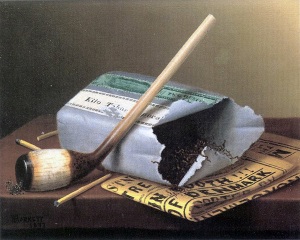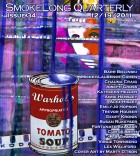This story is a novel excerpt. Can you tell us a little about how it fits into your book and what your book is about?
The novel recounts the life of an unnamed petty thief from his birth in the early 1960s to his death one hundred years later. The novel uses a non-linear structure working through the multiple story arcs of the various periods of the thief’s life.
“The Normal Thing” is taken from the arc covering the thief’s childhood, one of a number of scene fragments grouped around that arc’s larger, more or less central story.
Inspiration for the novel came from an article in a local newspaper here in France, in which a judge was reported as saying to someone appearing before her: “You’re 50 years old. You’ve been arrested 27 times since 1974. Is this what you call a life?”
I wanted to answer that question.
I like how the point of view shifts several times in this story. You do that well, even though I think that is pretty hard to accomplish in so little words. What are the purposes of these shifts in this story? Why not just tell it from the lady’s perspective?
These perspective shifts occur throughout the novel. It’s a way of commenting on the thief’s life, but really on who and what we all are. In the novel, the thief—the protagonist, the main character—is really quite passive. He never speaks, for example. Except he tends to have an influence on all the people around him, on the decisions they make, on the actions they take, on their relationships.
Telling the story only from the woman’s perspective would make this all about her, when it’s not. We’re all in this together. In a hole in the sand.
I credit Jose Saramago with helping me become aware of the potential of shifting perspectives. He’s a master at it—this is something that occurs in many of his novels. He’ll begin by following one character and slowly transition to following someone else altogether. I’ve also adopted Saramago’s rejection of quotation marks—I like how this allows the dialogue to become part of the narrative, rather than existing somehow as a separate entity. It’s the stylistic equivalent of a perspective shift.
So will the little boy be ok?
He was quite happy digging his hole!
What brings you to France, and what is the best and worst thing about living there?
I first moved overseas when I was 25, lived in Amsterdam for seven years. Came back to the States and met my wife, a French girl on vacation, a few weeks later. We didn’t want to have children in the States, where the educational and health care systems are scarily undemocratic, so we moved here. But I’m a happy expatriate—I like being a foreigner.
I truly appreciate the quality of life in France. Being rich here means having your own cherry tree, good friends and at least one bottle of wine to share at dinner.
The worst part about being here is the fear that France might become too much like the States. There’s a chilling wind blowing in from the right.
Do you prefer writing shorter pieces or longer narratives?
I’ve always considered myself a novelist, even though it’s taken me several drawers filled with failed manuscripts to reach this novel—it’s the first one I hope to publish. I believe novels have the unique potential to develop an entire world within their pages, and I’ve always been interested in the possibility of writing “complete” novels, in which everything is important: the use of language, the narrative structure, the stylistic elements and choices. For me, these are as important to the theme as the characters and the plot.
That said, I work in story fragments, in multiple story arcs—in that sense, my novels tend to be constructions of many inter-linked short stories. And my favorite writer is Isaac Babel, for his Red Cavalry.
Before taking on the final revision of this novel, I decided to take a few months to work on writing short stories for the first time. I’ve really enjoyed this process—I love that the shorter format, and especially the flash fiction format, forces me to tighten my language, forces me to look more closely at what is essential to the story. Maybe I shouldn’t have quit smoking. I might have tried the “SmokeLong” format much earlier!




 The core workshop of SmokeLong Fitness is all in writing, so you can take part from anywhere at anytime. We are excited about creating a supportive, consistent and structured environment for flash writers to work on their craft in a community. We are thrilled and proud to say that our workshop participants have won, placed, or been listed in every major flash competition. Community works.
The core workshop of SmokeLong Fitness is all in writing, so you can take part from anywhere at anytime. We are excited about creating a supportive, consistent and structured environment for flash writers to work on their craft in a community. We are thrilled and proud to say that our workshop participants have won, placed, or been listed in every major flash competition. Community works.